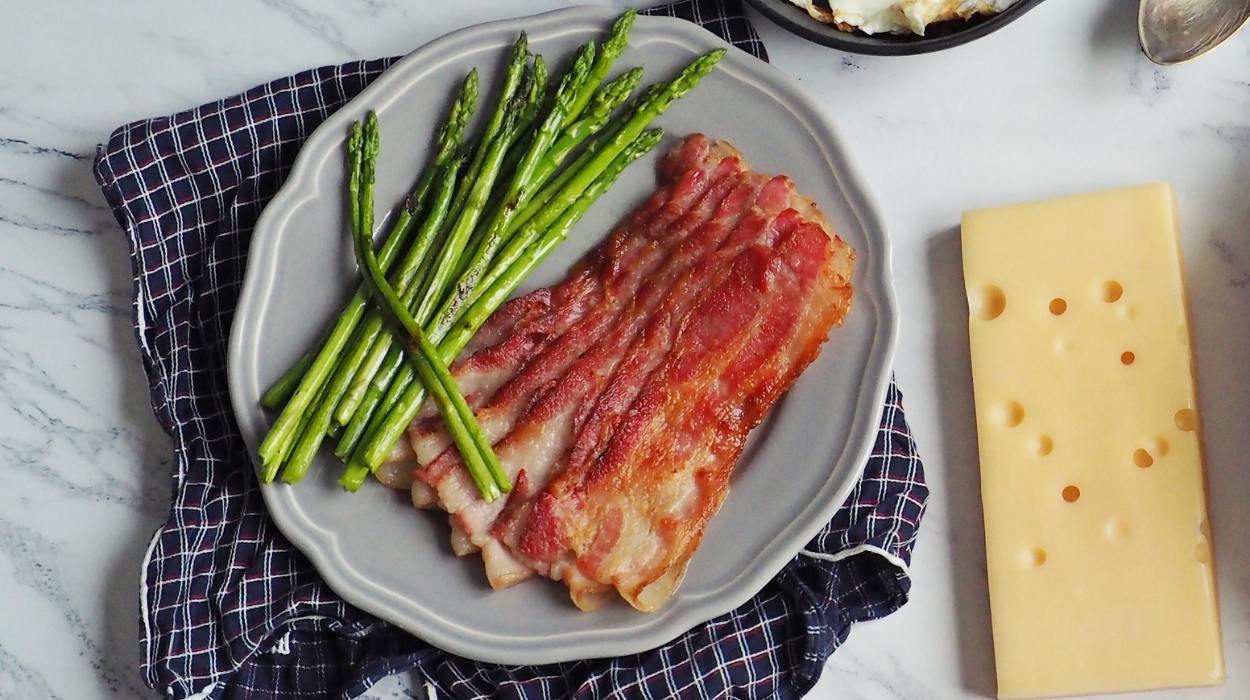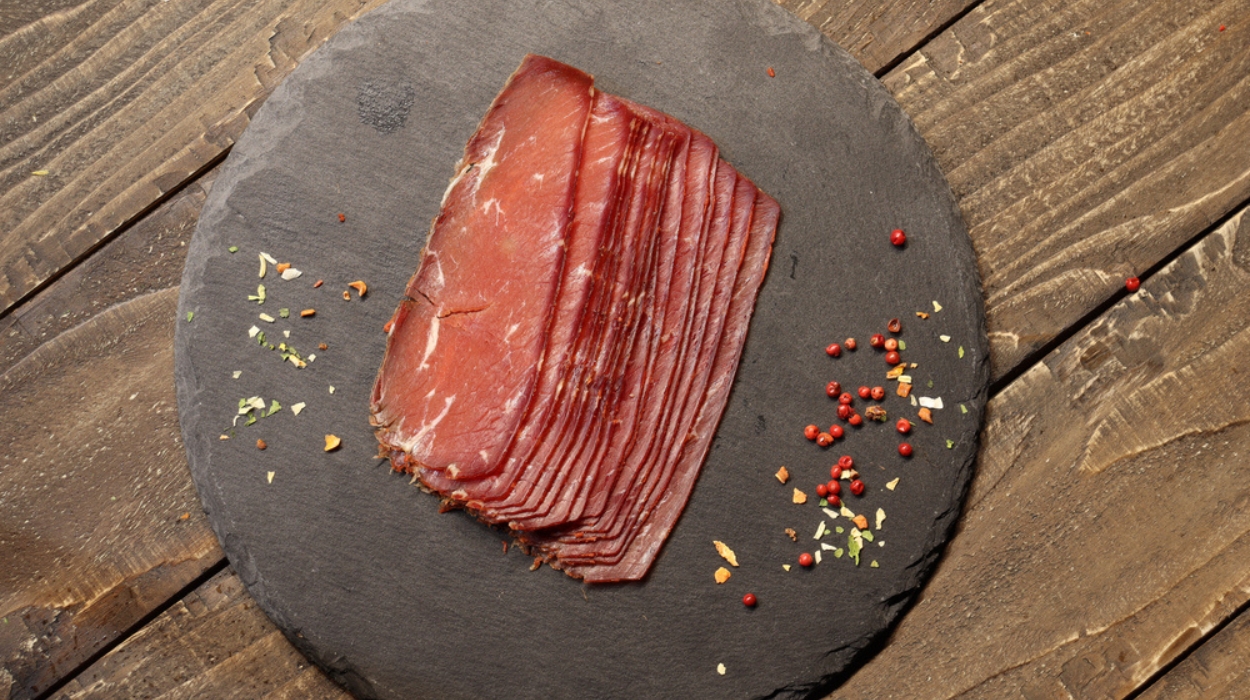Bacon is consumed worldwide, typically as a side dish with breakfast. Bacon is made by taking pork meat and smoking it to cure the meat. Bacon is not a particularly healthy food, partially due to its strong link with cancer,[1] but is bacon good for weight loss?
The answer is: probably not. Bacon is high in saturated fat,[2] making it more likely to contribute to weight gain than weight loss. However, bacon has no carbohydrates, which, for some people, is an important criterion for their weight loss diet.
This article explores bacon’s nutritional values, risks, and tips for consuming it.
Is Bacon Good For Losing Weight?
Probably not. Bacon is high in salt, cholesterol, and saturated fat.[2] If you consume too much bacon, you may gain weight. However, bacon has no carbohydrates, making it an acceptable food on a low-carb diet such as the ketogenic diet.
For some, eating a low-carb diet may work for weight loss, but this may not be the case for everyone. Additionally, the amount and frequency at which you consume bacon can alter weight loss outcomes.
Is Bacon Good For Weight Loss?

Many experts would say bacon is not good for weight loss because it is high[3] in saturated fat and cholesterol. Foods high in saturated fats and cholesterol are also typically high in calories.
There is a strong correlation between weight, cholesterol, and disease risk. Consuming foods high in saturated fat and cholesterol may raise low-density lipoprotein or LDL cholesterol,[4] which can increase the risk of heart disease and stroke.
Maintaining a healthy weight[5] helps reduce the risk of cardiovascular disease,[6] and eating a diet low in cholesterol, calories, and saturated fats can help you achieve a healthy weight. While you should avoid saturated fats, you should consume[7] unsaturated, healthy fats, such as those found in oily fish, avocados, nuts, and seeds. Healthy fats are necessary not only for weight loss but also for overall health.
However, for some individuals, bacon is good for losing weight because it has protein and no carbohydrates. Many weight loss diets, such as Atkin’s diet and the ketogenic diet, emphasize few carbohydrates. Therefore, bacon can be a delicious component in these diets.
The ketogenic[8] diet encourages high fat, moderate protein, and minimal carbohydrates. This forces the body to burn fat instead of carbohydrates for energy. If your weight loss plan requires you to keep carbohydrates at a minimum, consuming bacon adheres to these guidelines.
The Nutritional Value Of Bacon
Bacon’s nutritional value can vary depending on the type[9] and preparation of the bacon.
One slice, or 28 grams, of cured pork bacon contains 110 calories,[10] 3.84 grams of protein, and 10.4 grams of fat. Bacon has no carbohydrates or fiber. Bacon contains several vitamins and minerals including phosphorus, magnesium, choline, vitamins A, niacin, potassium, selenium, and sodium.
How To Eat Bacon For Weight Loss?

Consume In Moderation
Consume bacon sparingly for weight loss. Bacon is good for a low-carb diet because it contains no carbohydrates, however, it should not be eaten in excess. Instead, enjoy one or two slices periodically, or sprinkle small portions of bacon bits on healthy food dishes once in a while.
Eat Turkey Bacon Instead
Another way to reduce your calorie consumption without giving up bacon altogether is by swapping out regular bacon for turkey bacon. While turkey bacon is still processed meat, it may be healthier and more weight-loss-friendly than pork bacon. One slice, or 28 grams, of turkey bacon contains 40 calories, which is almost one-third fewer calories than pork bacon.
Eat Bacon With Healthy Foods
Because bacon is high in fat and cholesterol, it’s best not to consume it with other high-fat, high-calorie, or high-cholesterol foods. Instead, add a few bacon bits to a salad, or eat a few slices with a large portion of vegetables.
Bake Bacon
Instead of frying bacon, which can raise the calorie and fat content, bake bacon instead. Lay a few slices on a baking tray and put it in the oven until it’s fully cooked.
Consult A Doctor Or Nutritionist
Discuss your weight loss goals with a doctor or nutritionist who can help establish how many calories and grams of fat you need to eat daily in order to reach your desired weight. This can help you determine exactly how much bacon is safe for you to consume.
Potential Drawbacks & Precautions
Linked With Cancer
Aside from being high in saturated fat and cholesterol, bacon may have carcinogenic properties. It may increase the risk[11] of colorectal cancer, in part due to the high amount of nitrites[12] in bacon, which preserves the meat. It may also be due to high-temperature[13] cooking methods.
Dangers Outweigh Nutrients
Bacon offers protein and some vitamins and minerals. However, these nutrients can be obtained from many other, healthier foods. Consider more nutritious breakfast options for weight loss, such as oatmeal, eggs, or yogurt.
Additional Supplementation May Be Needed
Overconsuming bacon can not only inhibit weight loss, but it may also contribute to weight gain. However, even cutting back on bacon may not be enough for some individuals to reach their desired weight.
If you need weight loss support beyond diet, consult a doctor about taking weight loss supplements such as the best fat burners and developing an exercise routine.
Conclusion
Bacon is high in saturated fat, sodium, and cholesterol, making it less than ideal for weight loss. Additionally, consuming bacon poses more health risks than nutritional benefits. For many individuals, it’s best to avoid or limit bacon if your goal is to lose weight.
However, bacon does contain some protein but no carbohydrates. This macronutrient distribution aligns with low-carbohydrate diets such as the ketogenic diet, which have been shown to promote weight loss in some individuals.
Frequently Asked Questions
It depends. Bacon is high in salt, cholesterol, and saturated fat. For many people, this may cause weight gain. However, bacon also has no carbohydrates, making it permissible on many low-carb weight-loss diets.
Bacon has saturated fat, which is considered “bad” fat. This type of fat can raise LDL cholesterol and increase the risk of heart disease.
No, meats cooked at higher temperatures and meats that are charbroiled have higher carcinogenic properties.
Only your doctor or nutritionist can recommend a specific frequency for eating bacon. This will depend on your health status and your weight loss goals. However, it’s generally best not to consume too often.
Yes. Both pork and turkey bacon are processed meats, which are not ideal for health or weight loss. However, turkey bacon has fewer calories and saturated fat than pork bacon.
There is no established time of day that is best for eating bacon. It is generally best not to overconsume bacon. However, the time of day you do consume it will not lead to significantly different results.
Eggs, oatmeal, berries, smoothies, vegetables, and unprocessed meats are healthier breakfast options than bacon.
 Evidence Based
Evidence Based
